Special Report
The Net Worth of the American Presidents: Washington to Trump

Published:
Last Updated:

Since 2001, the annual presidential salary has been set at $400,000. Even before that, every president has been paid well. George Washington’s salary of $25,000 was equivalent to over $700,000 in modern dollars when adjusting for inflation. Yet almost none of the presidents have needed the money, as most commanders in chief had already earned or inherited fortunes — from their parents or through marriage — before being elected.
24/7 Wall St. examined the finances of every American president, from George Washington to Donald Trump. For the purposes of comparison, we provided net worth figures for each president in current dollars. Because a number of presidents, particularly in the early 19th century, made and lost huge fortunes in a matter of a few years, we only provided each president’s net worth at their peak.
In America’s early days, only property-owning white men were allowed to vote. Consequently, only the wealthy first participated in American politics, meaning the first presidents were all well-off. While there have been some middle-class presidents in the intervening years, many contemporary commanders in chief also earned extravagant wealth — sometimes in excess of $100 million, when adjusted for inflation. These are America’s 12 wealthiest presidents.
Even being president does not insulate one from market forces and financial mismanagement. Some presidents had failed business ventures in their early careers, while others became insolvent after leaving office, frittering away their fortunes. These are America’s presidents who went broke.
Click here to see the net worth of all the American presidents
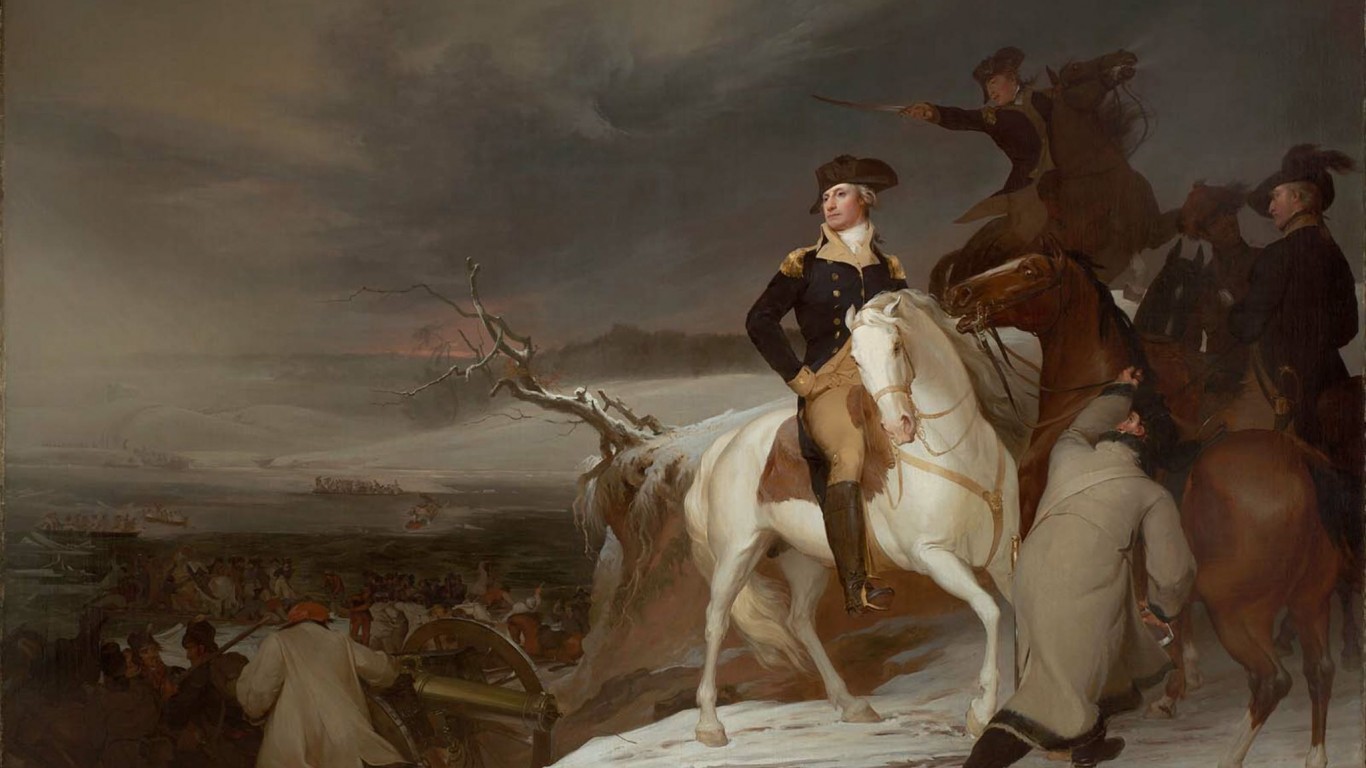
1st: George Washington
> Est. peak net worth: $594.2 million
> In office: 1789-1797
George Washington was America’s first president and also its wealthiest for more than a century. He inherited his extremely successful plantation, Mount Vernon, from his half brother. Washington also made substantial money as a general and as president. His presidential salary in 1789 was 2% of the total U.S. budget.
[in-text-ad]

2nd: John Adams
> Est. peak net worth: $21.5 million
> In office: 1797-1801
John Adams’s wife, Abigail, was a member of the Quincys, a prestigious Massachusetts family, and a savvy investor, helping make herself and her husband wealthy. Adams owned a handsome estate in Quincy, Massachusetts. The estate, known as Peacefield, covered approximately 40 acres. He also had a thriving law practice.
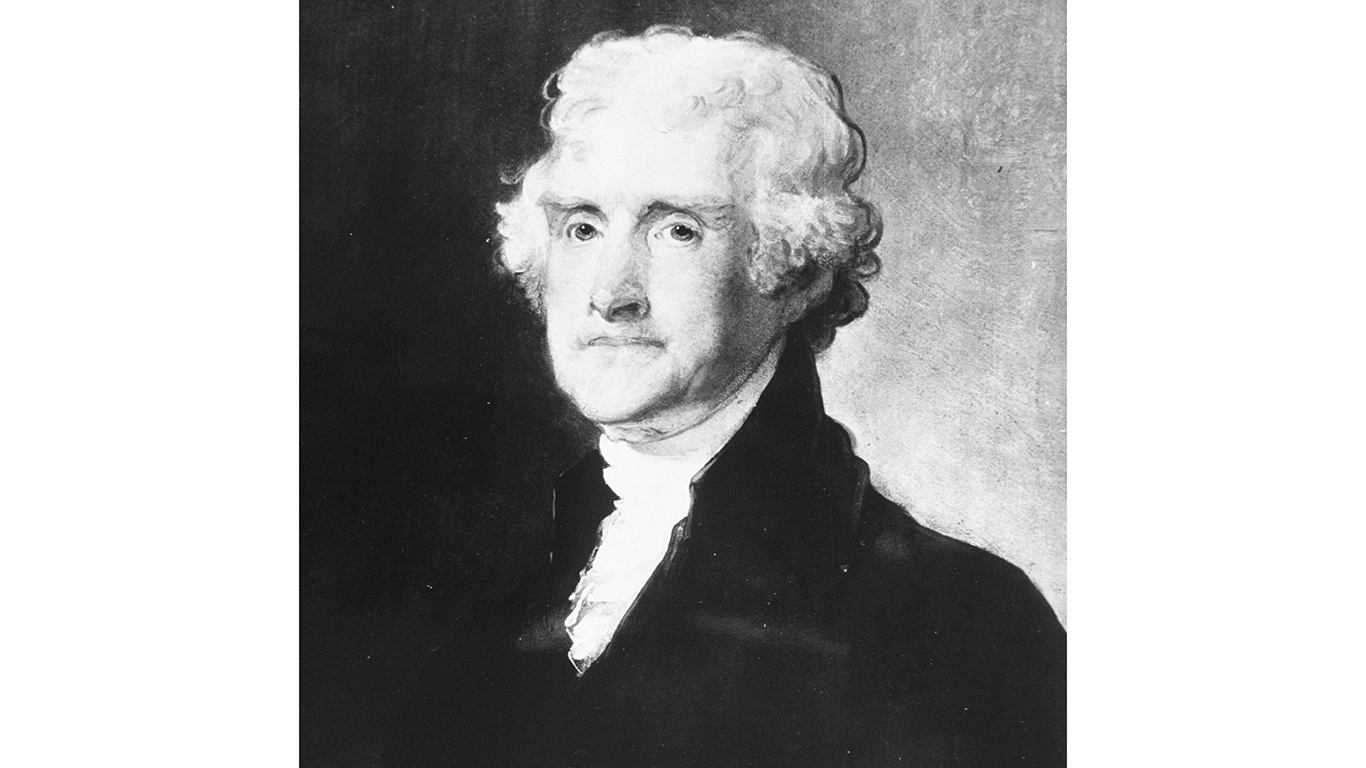
3rd: Thomas Jefferson
> Est. peak net worth: $239.7 million
> In office: 1801-1809
When he was a teen, Thomas Jefferson inherited 3,000 acres of land from his father near present-day Charlottesville, Virginia. Jefferson expanded the land to 5,000 acres and built his architecturally advanced home Monticello. Though he was extremely wealthy for most of his life, he died in a great deal of debt, and his eldest daughter had to rely on charity for income.
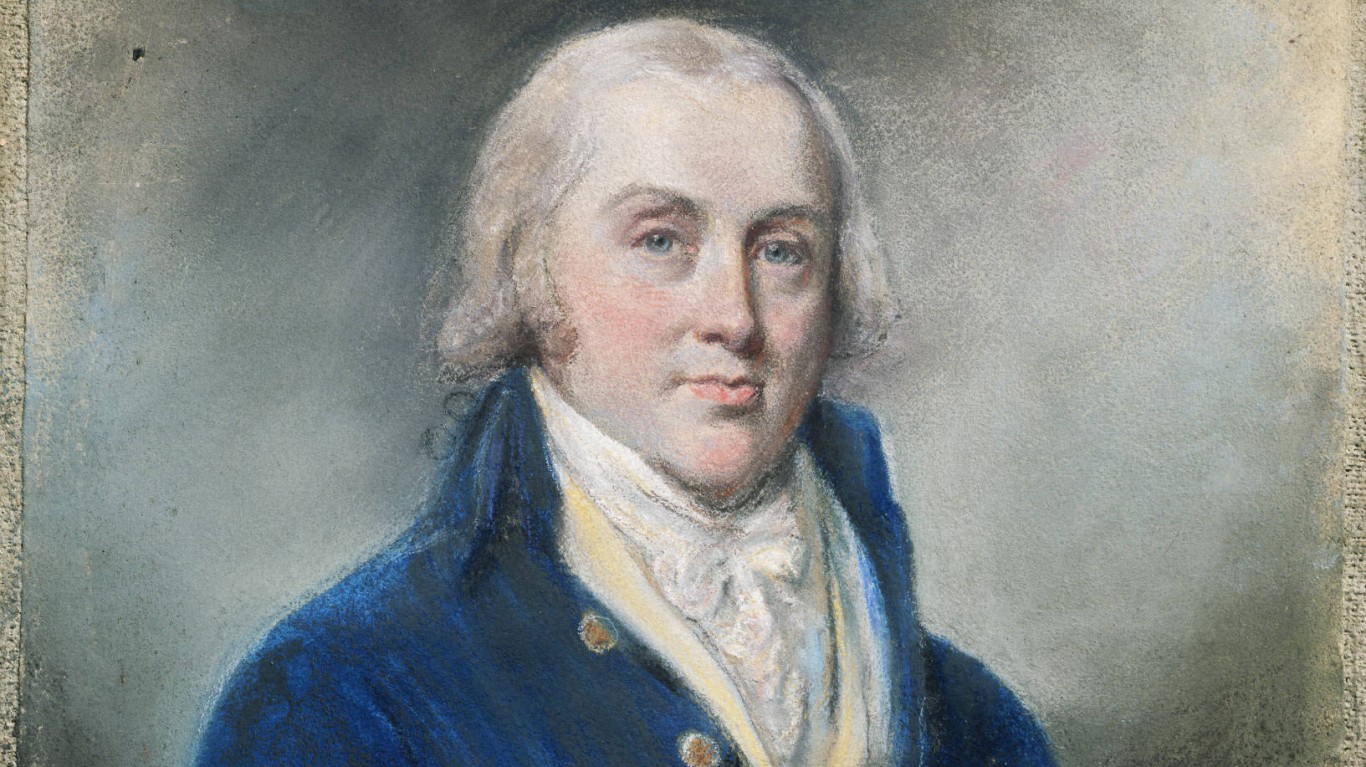
4th: James Madison
> Est. peak net worth: $114.7 million
> In office: 1809-1817
James Madison was born to wealthy parents in Orange County, Virginia. His parents ran a successful plantation and eventually built the famed Montpelier estate on their land. They owned several thousand acres of land and dozens of slaves. Though wealthy at one point, Madison’s fortunes dwindled towards the end of his life. His plantation was not successful, and he was further strained by his stepson’s debts.
[in-text-ad-2]
5th: James Monroe
> Est. peak net worth: $30.7 million
> In office: 1817-1825
James Monroe’s wife, Elizabeth, was the daughter of a wealthy privateer. Monroe spent his pre-presidential career practicing law and in public service. During his time in the White House, Monroe did not attend to his finances and he entered retirement severely in debt and was forced to sell his plantation.
6th: John Quincy Adams
> Est. peak net worth: $23.6 million
> In office: 1825-1829
John Quincy Adams inherited his father’s Peacefield home. His wife was the daughter of a wealthy merchant. He devoted most of his adult life to public service, notably after leaving office.
[in-text-ad]
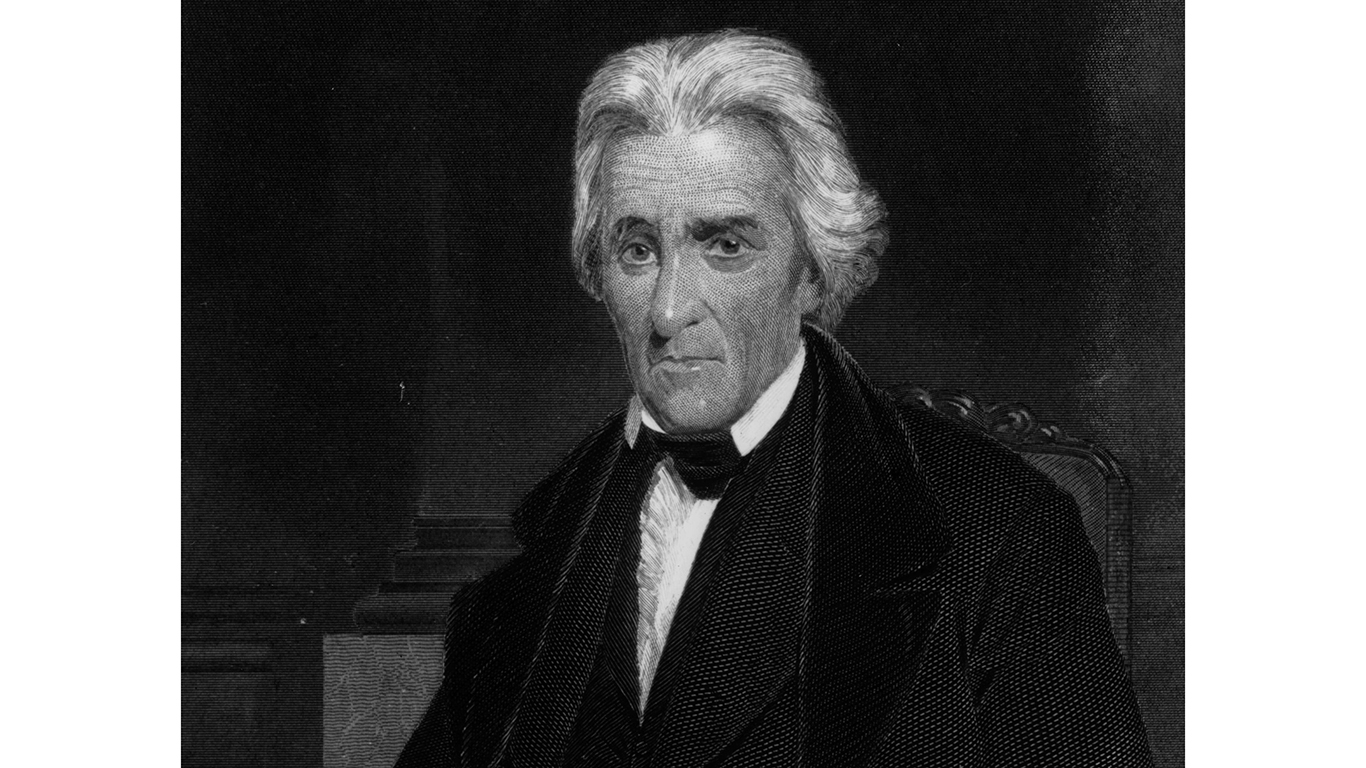
7th: Andrew Jackson
> Est. peak net worth: $134.2 million
> In office: 1829-1837
Born poor in 1767, Andrew Jackson became wealthy through his law practice. He also inherited a fortune from his wife Rachel. By 1804, Jackson owned nine slaves and was wealthy enough to build a mansion, the Hermitage. As the estate grew more successful, he continued to expand his land and purchase more slaves. Jackson owned about 150 people at the time of his death.
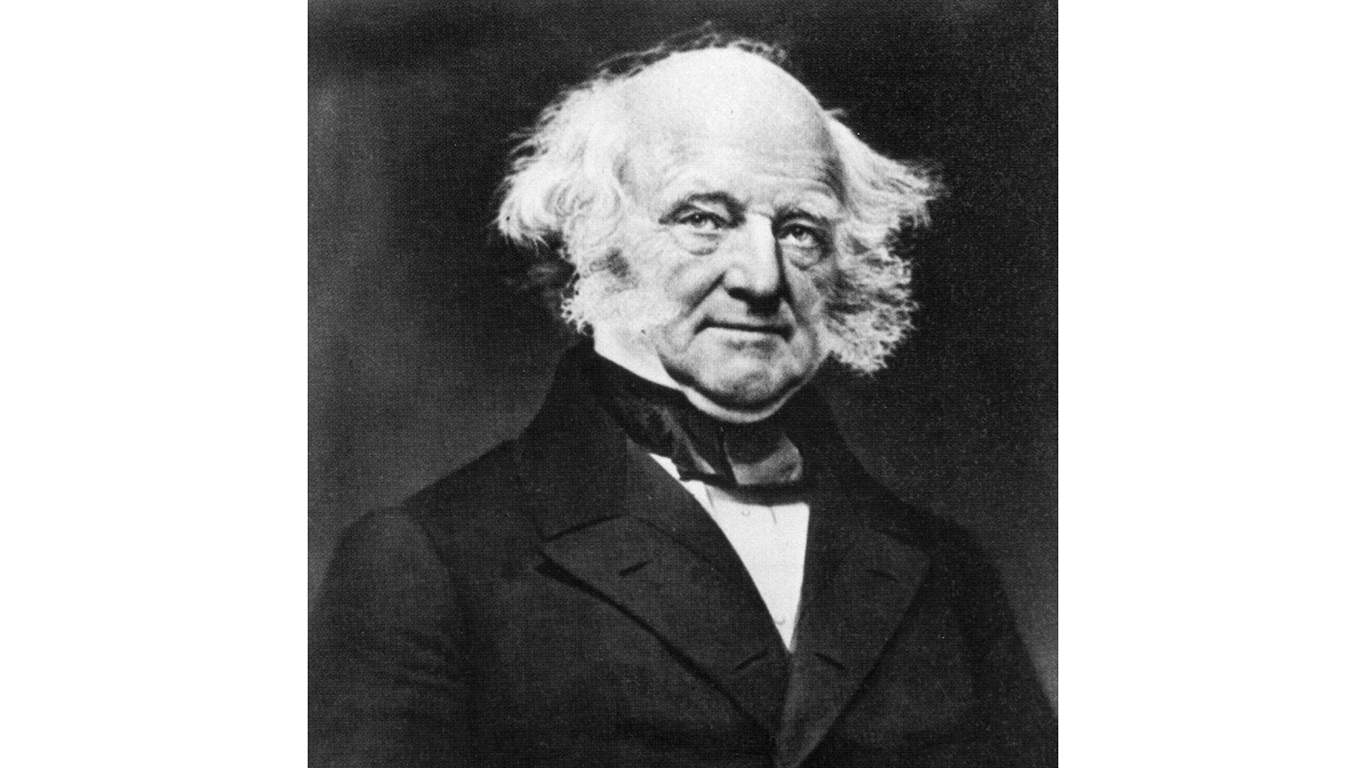
8th: Martin Van Buren
> Est. peak net worth: $29.7 million
> In office: 1837-1841
Martin Van Buren had a substantial income as an attorney. He is one of only two men in U.S. history to serve as secretary of state, vice president, and president. He owned the 225-acre Lindenwald estate in upstate New York.
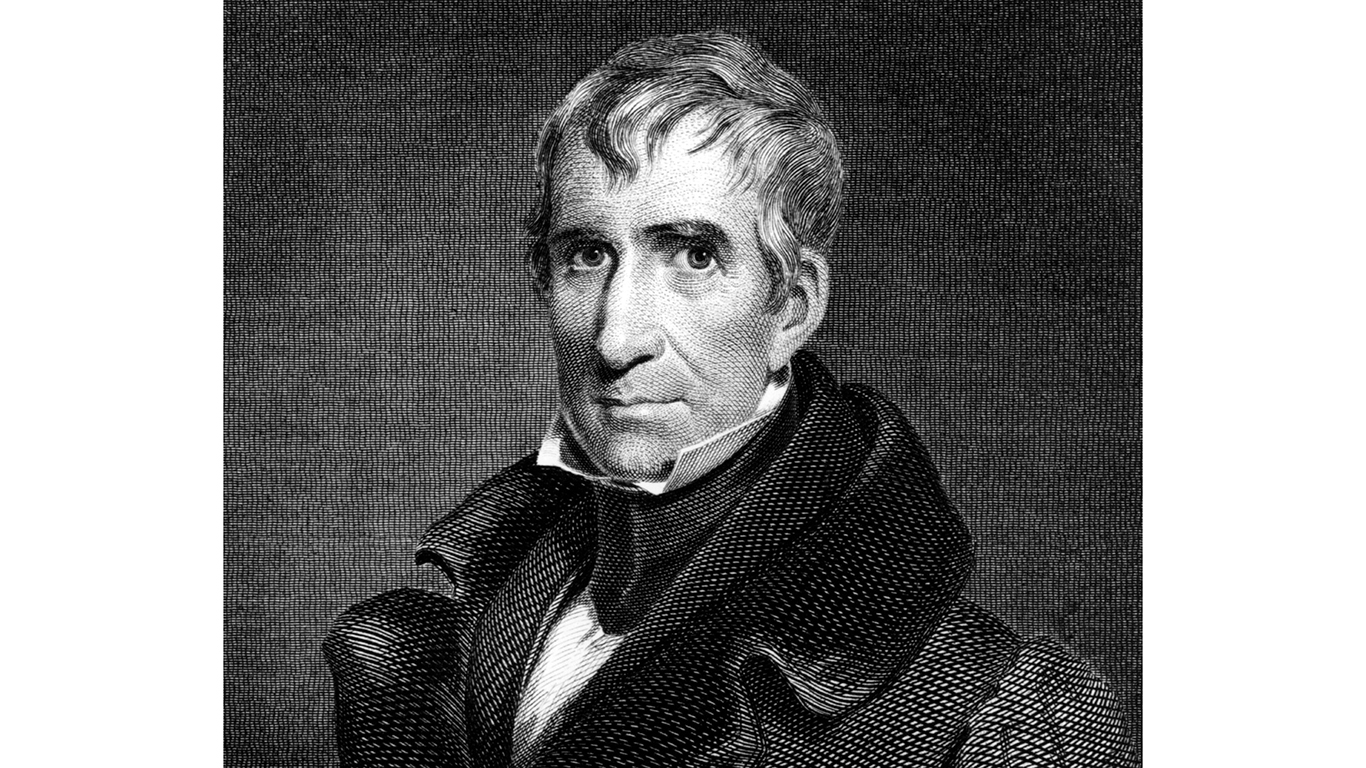
9th: William Henry Harrison
> Est. peak net worth: $6.2 million
> In office: 1841
William Henry Harrison married into money â his wife’s father was a prominent judge and landowner. When Harrison’s father died, he inherited 3,000 acres near Charles City, Virginia, which he later sold to his brother. He also owned Grouseland, a mansion and property in Vincennes, Indiana. Despite his assets, Harrison died penniless. Upon his death, Congress created a special pension for his widow.
[in-text-ad-2]
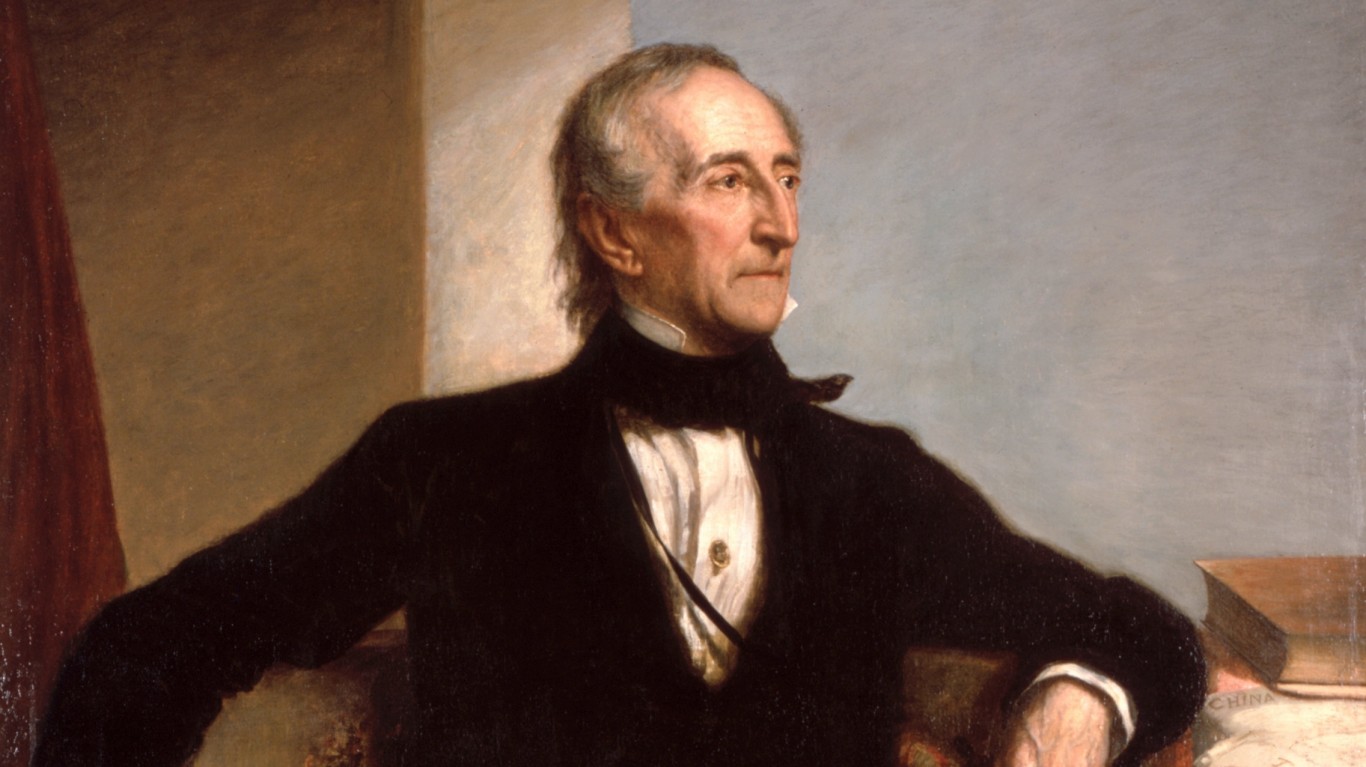
10th: John Tyler
> Est. peak net worth: $58.4 million
> In office: 1841-1845
John Tyler was one of many presidents whose inheritance of land and property became largely his source of wealth. From his parents, he inherited the thriving family tobacco plantation in Virginia. And when his first wife, Letitia, died while he was in office, he inherited her fortune as well.

11th: James Knox Polk
> Est. peak net worth: $11.3 million
> In office: 1845-1849
Like his wife, Sarah Childress, James Polk’s father was a wealthy plantation owner and speculator. Polk’s salaries as speaker of the house and governor of Tennessee contributed to his wealth. He owned over 900 acres in Mississippi. He also owned dozens of slaves.
[in-text-ad]
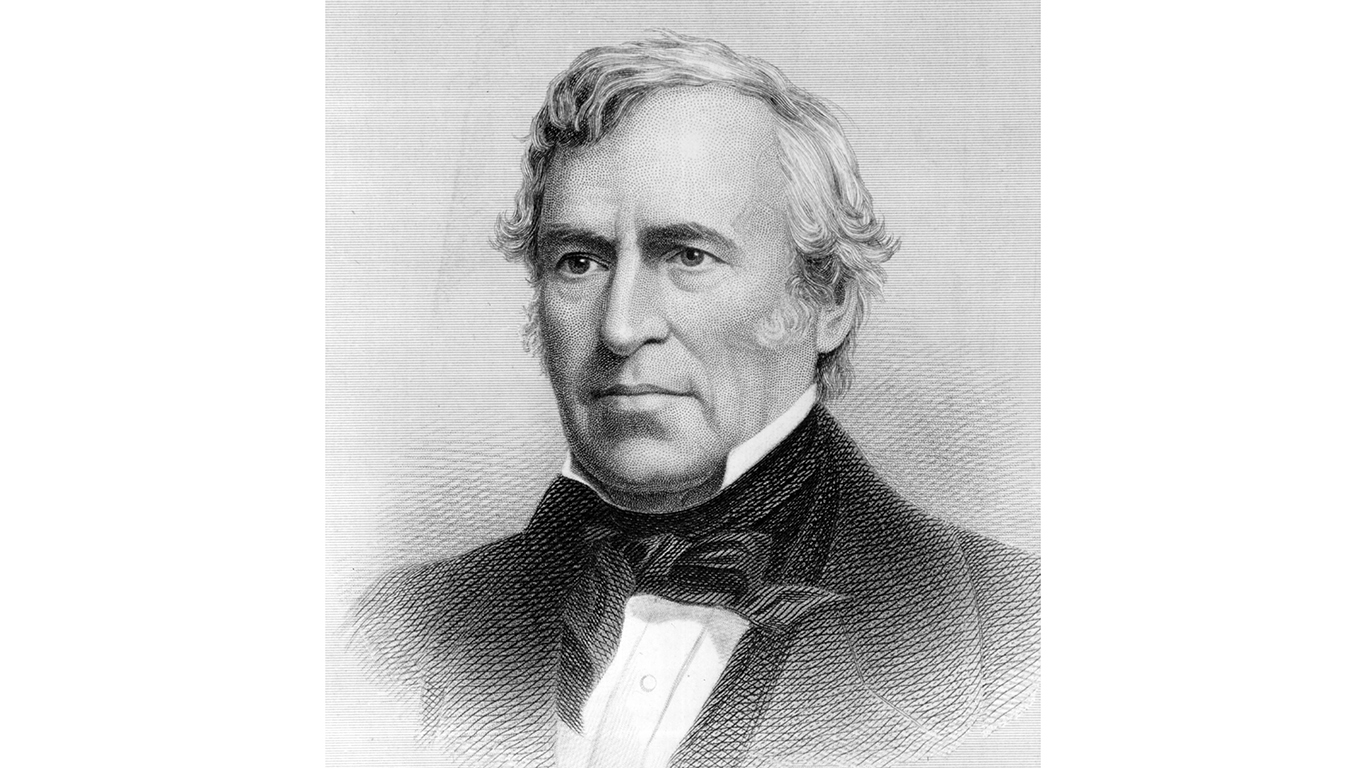
12th: Zachary Taylor
> Est. peak net worth: $7.2 million
> In office: 1849-1850
Zachary Taylor grew up on a plantation and would go on to own significant amounts of land, including property in Mississippi, Kentucky, and Louisiana. His successful land speculation deals also added to his wealth.
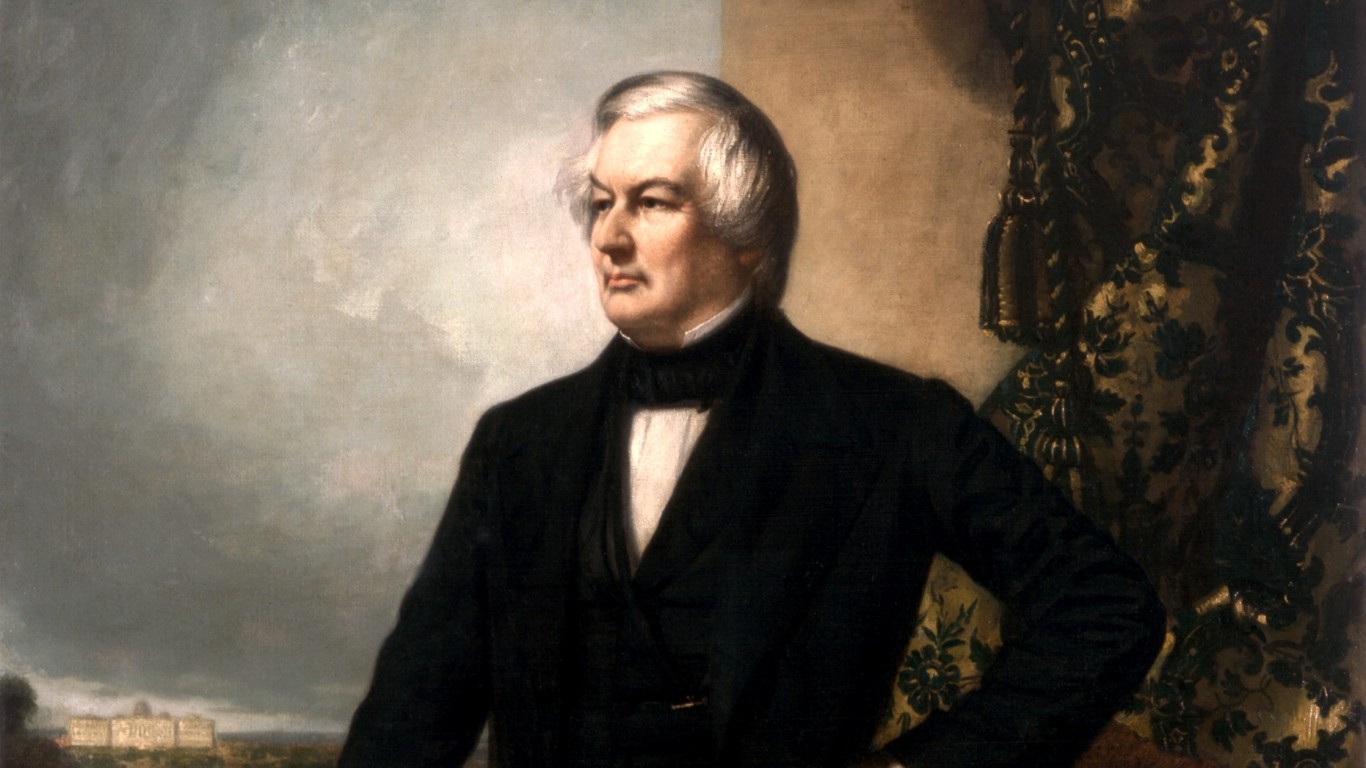
13th: Millard Fillmore
> Est. peak net worth: $4.1 million
> In office: 1850-1853
Neither Millard Fillmore nor his wife had significant inheritances. Fillmore founded a college that is the currently the State University of New York at Buffalo, and his primary holding was a house in nearby East Aurora, New York.
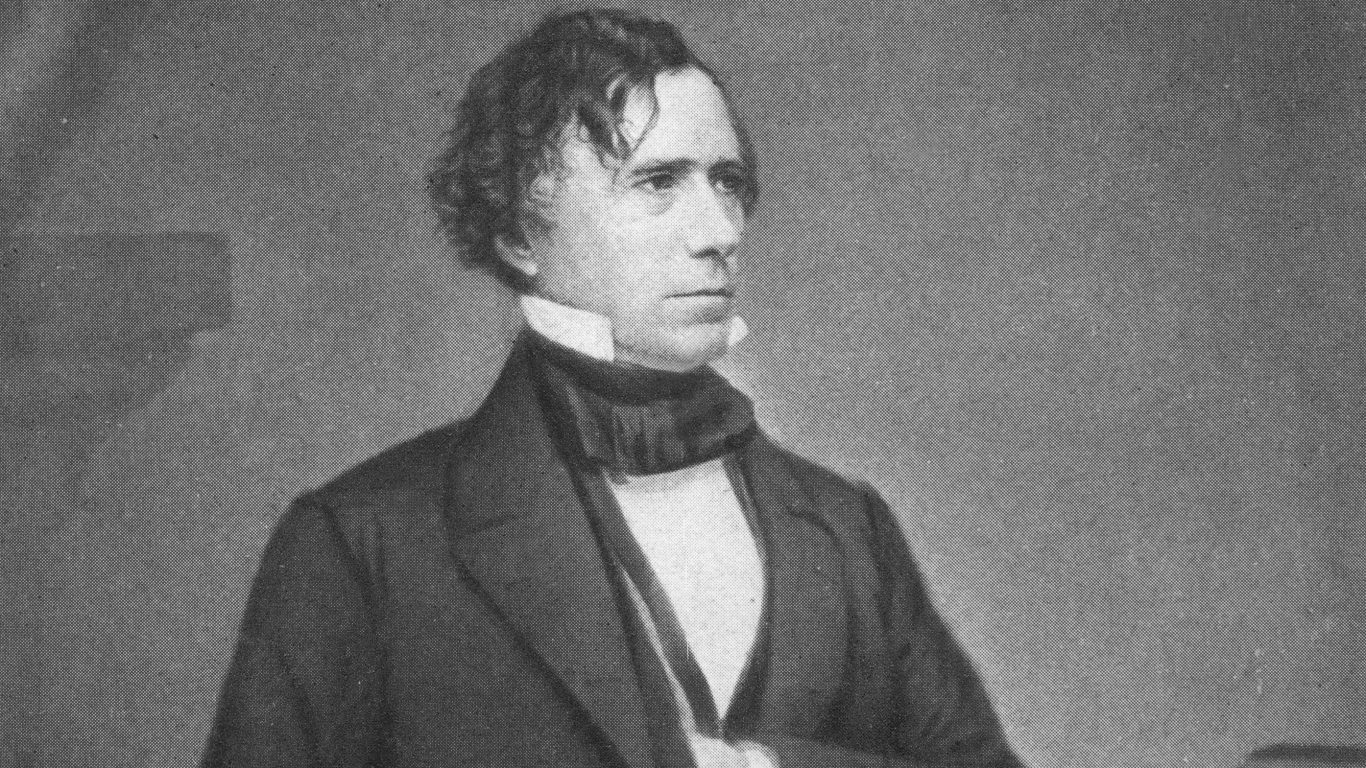
14th: Franklin Pierce
> Est. peak net worth: $2.0 million
> In office: 1853-1857
Franklin Pierce’s father was a politician, and his wife’s father was the former president of Bowdoin College, Pierce’s alma mater. He had a background in law and held property in Concord, New Hampshire.
[in-text-ad-2]
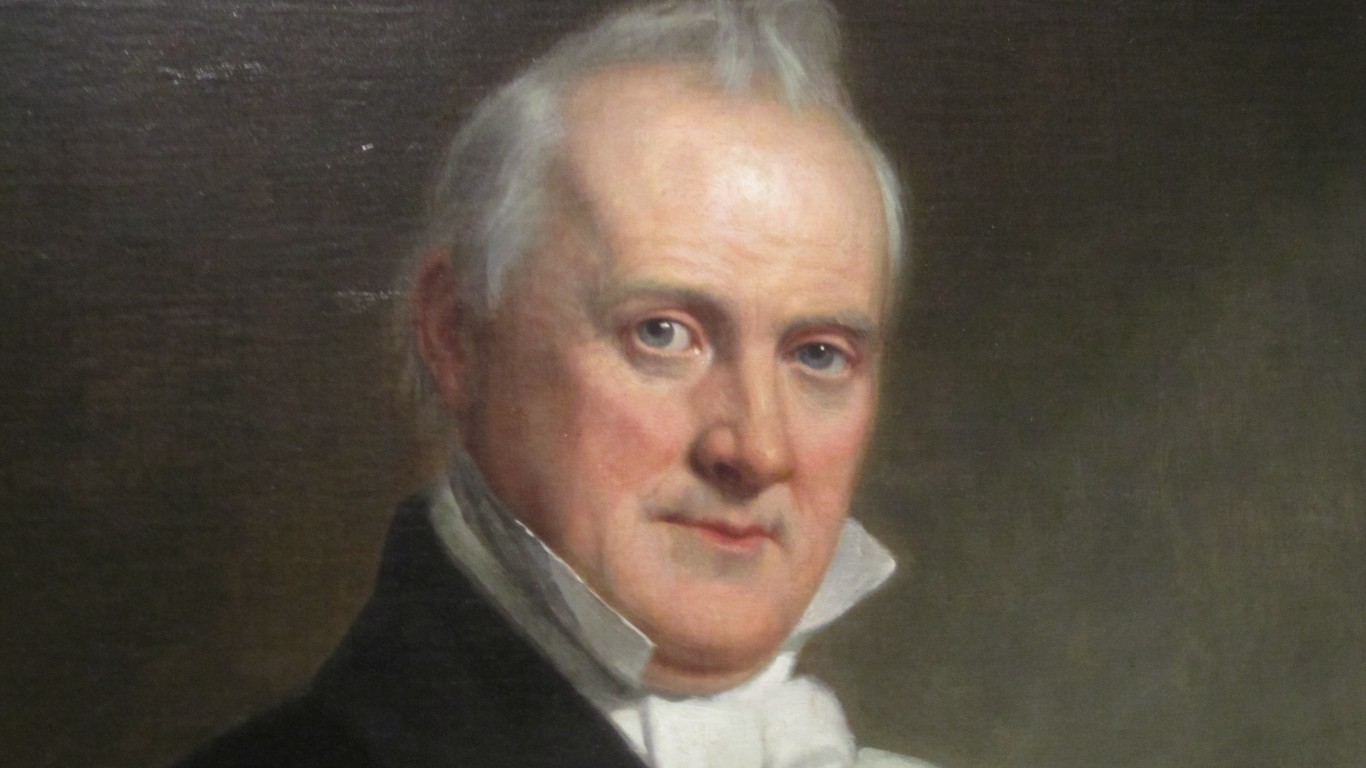
15th: James Buchanan
> Est. peak net worth: less than $1 million
> In office: 1857-1861
Born in a log cabin in Pennsylvania, James Buchanan was one of 11 children. He was the only president never to marry. He worked as an attorney before ascending through the ranks of politics as a state representative, U.S. congressman, senator, foreign minister, and secretary of state before becoming president. With most of life in public service and not coming for a wealthy family, Buchanan never accumulated much wealth.
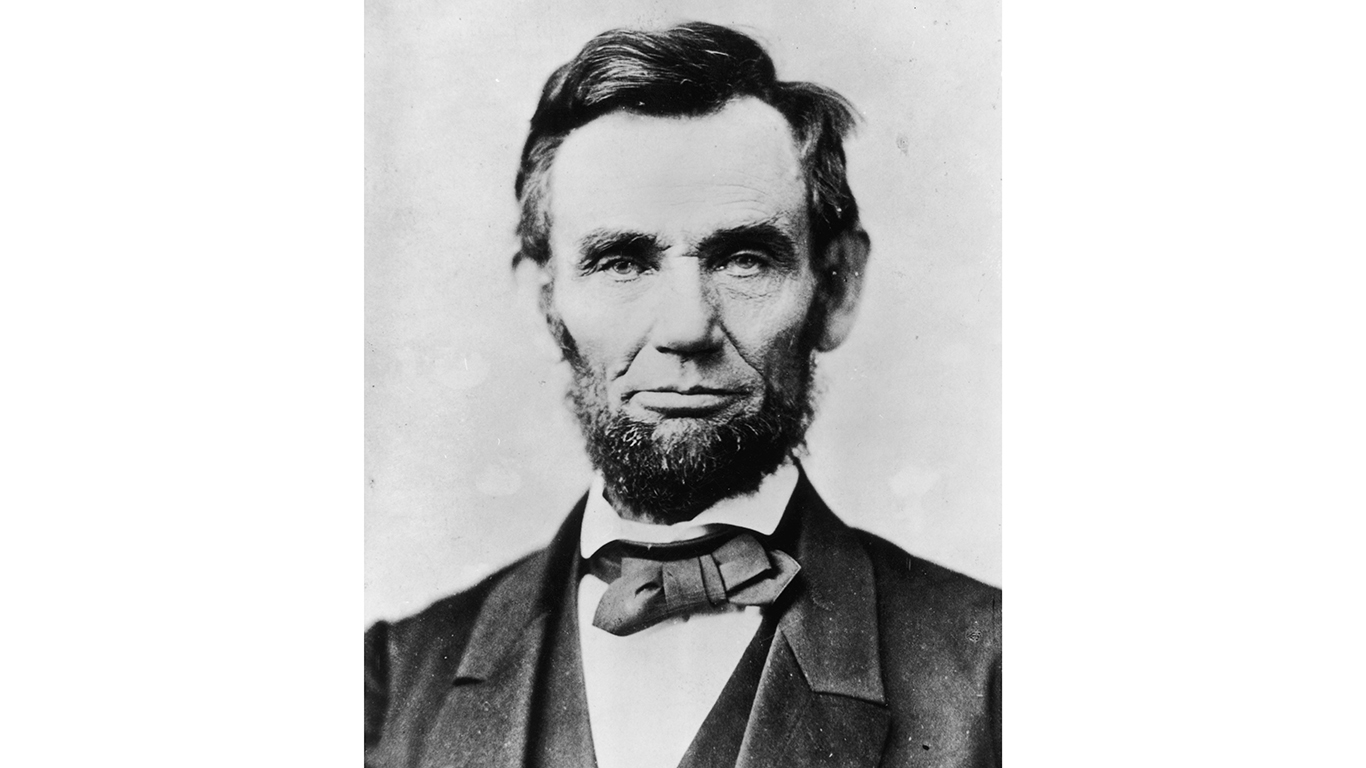
16th: Abraham Lincoln
> Est. peak net worth: less than $1 million
> In office: 1861-1865
Abraham Lincoln served as an attorney for years before his presidency. He also worked in manual labor and had a failed general store. He owned a single-family home in Springfield, Illinois and was never especially wealthy.
[in-text-ad]

17th: Andrew Johnson
> Est. peak net worth: less than $1 million
> In office: 1865-1869
After his father died when he was very young, Andrew Johnson’s mother worked to support her family. Johnson worked as a tailor before moving into politics. He served the public for 20 years, including as governor of Tennessee and U.S. senator. Johnson owned a small house in Greeneville, Tennessee.
18th: Ulysses Simpson Grant
> Est. peak net worth: less than $1 million
> In office: 1869-1877
Ulysses S. Grant’s father was a tanner, and his wife was the daughter of a wealthy merchant. Grant lost almost all of his money when he was swindled by his son’s investing partner after his presidency. Although he died with little money, his autobiography, published posthumously, kept his family afloat.
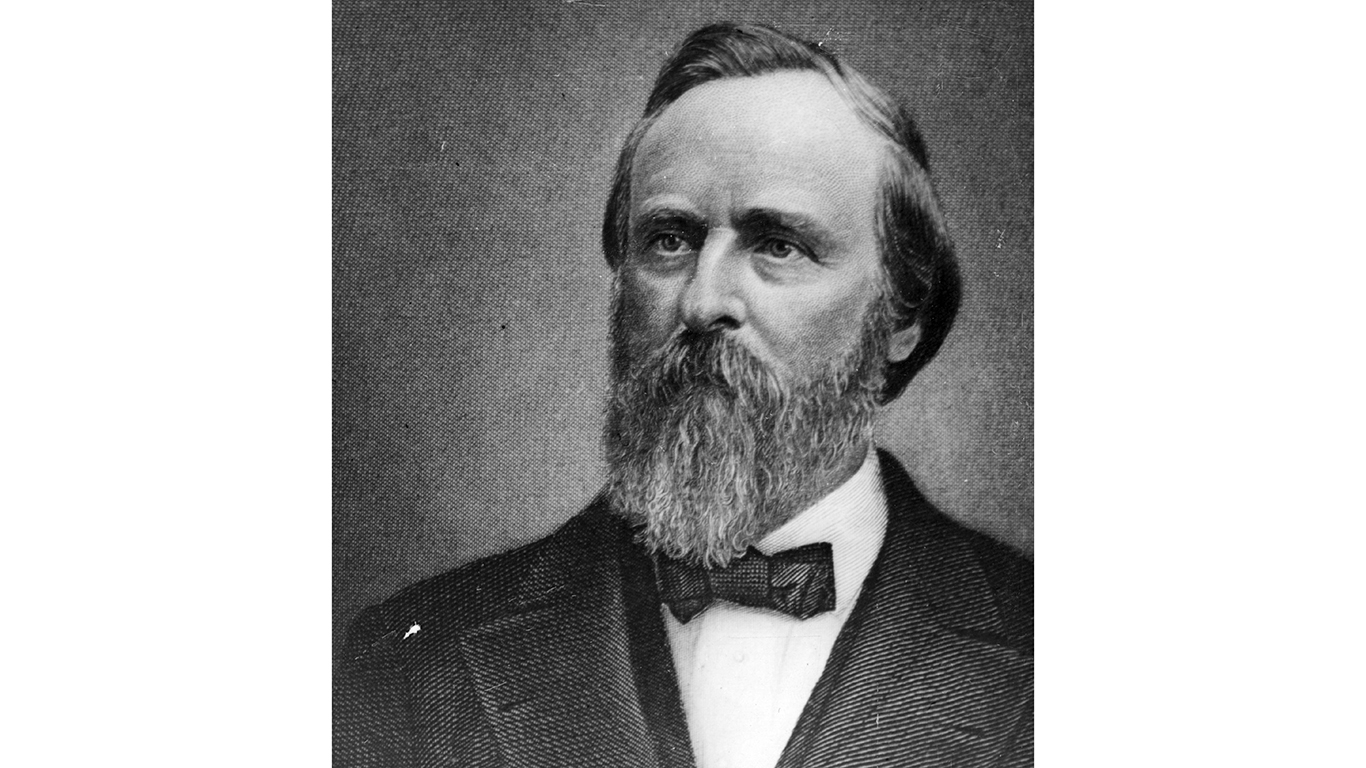
19th: Rutherford Birchard Hayes
> Est. peak net worth: $3.1 million
> In office: 1877-1881
Hayes was an attorney for 15 years and owned Spiegel Grove, a 10,000 square foot home that sat on 25 acres in Fremont, Ohio. Hayes also served as governor of Ohio and was a member of the House.
[in-text-ad-2]
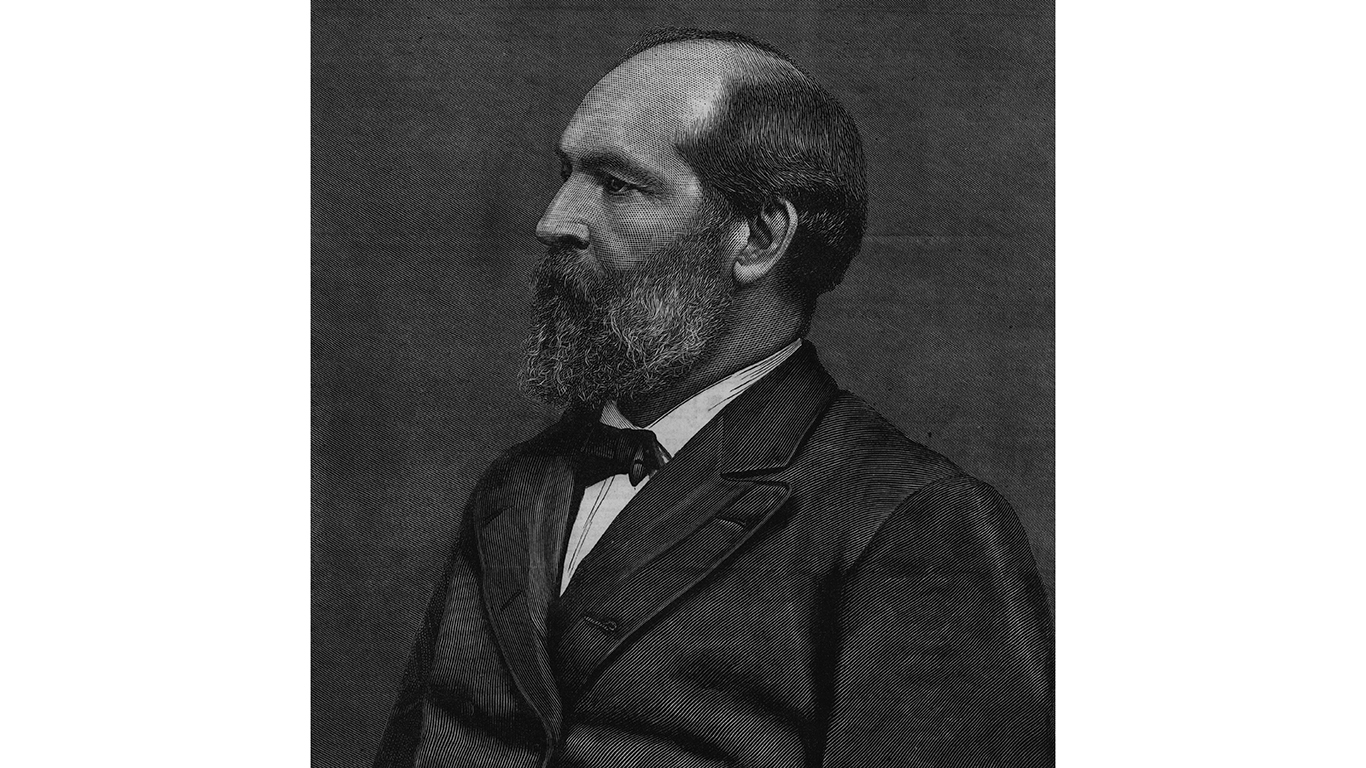
20th: James Abram Garfield
> Est. peak net worth: less than $1 million
> In office: 1881-1881
James Garfield was born in a log cabin in Ohio. He spent 18 years in the House of Representatives. Garfield owned Lawnfield, a home and small property in Mentor, Ohio. He was assassinated during the first year of his term.
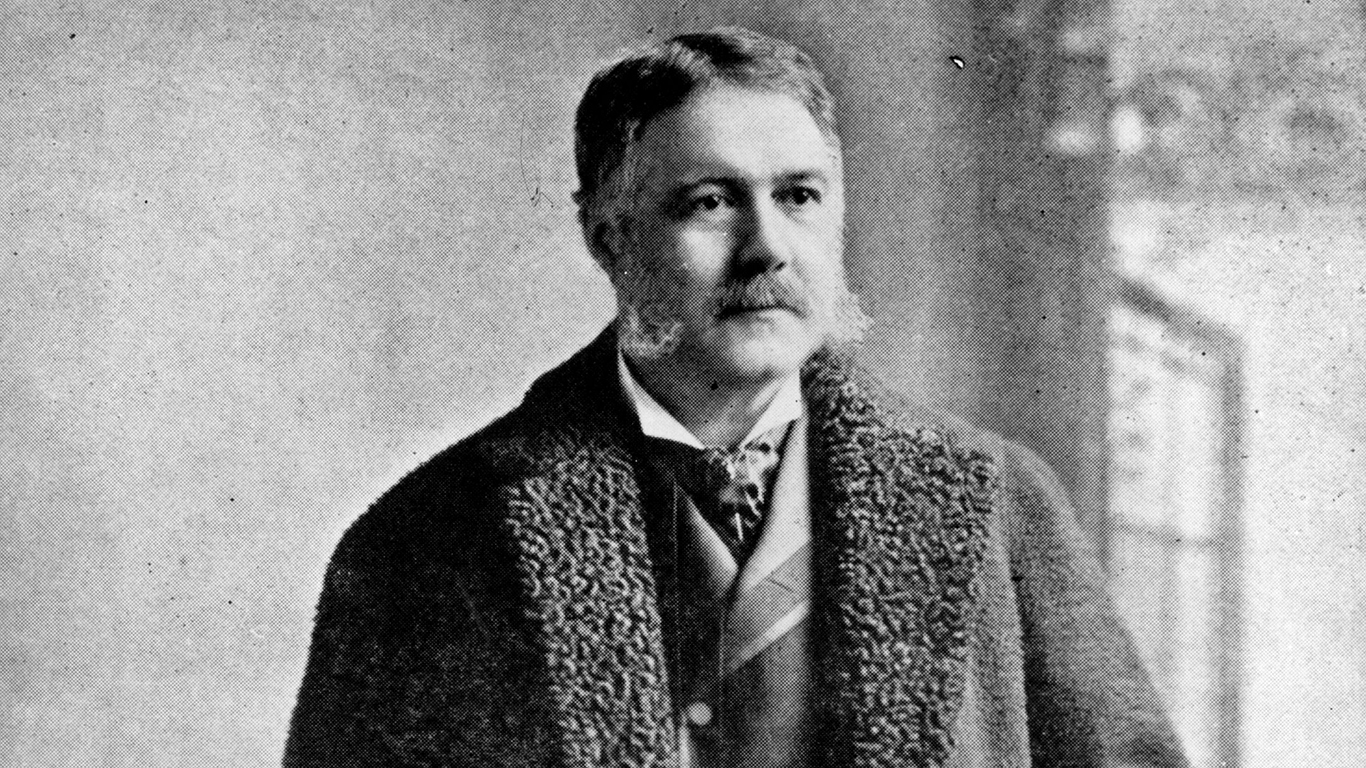
21st: Chester Alan Arthur
> Est. peak net worth: less than $1 million
> In office: 1881-1885
Chester Alan Arthur was the son of an Irish preacher, and his wife came from a military family. He managed to amass some wealth during his time as Collector of the Port of New York. He owned an opulently-decorated townhouse in New York city.
[in-text-ad]
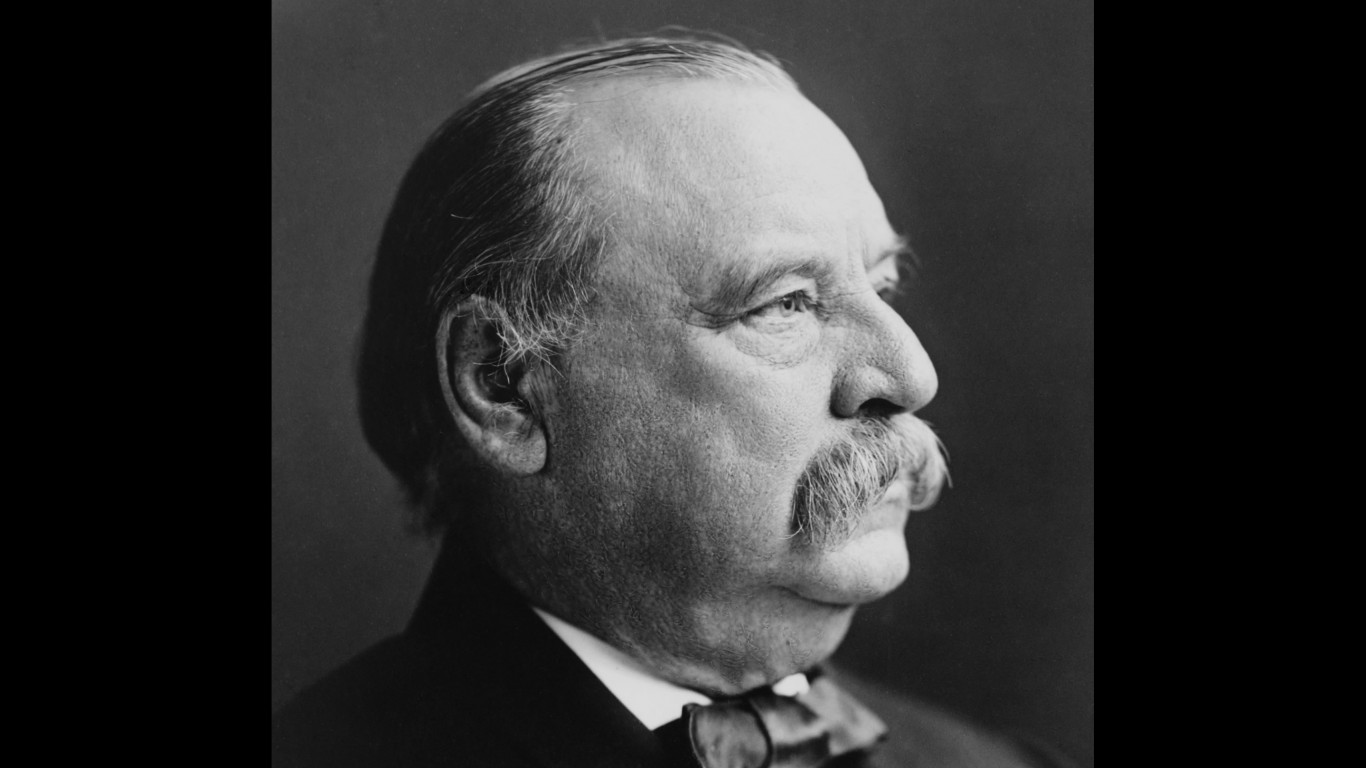
22nd, 24th: Grover Cleveland
> Est. peak net worth: $28.7 million
> In office: 1885-1889, 1893-1897
Grover Cleveland’s father was a poor Presbyterian minister. Cleveland served as an attorney for many years and was able to save some money. Before becoming president, he served as sheriff of Erie County, New York, and then governor of the state. After his presidency, Cleveland played the stock market and continued to practice law. He bought Westland Mansion in Princeton, New Jersey.

23rd: Benjamin Harrison
> Est. peak net worth: $6.2 million
> In office: 1889-1893
Benjamin Harrison had no significant inheritance of his own or from his wife’s family. He was a highly-paid attorney for many years, fought for the Union Army in the Civil War, and served as attorney for the Republic of Venezuela in a border dispute. Harrison owned a large Victorian home in Indianapolis, Indiana.
25th: William McKinley
> Est. peak net worth: $1.0 million
> In office: 1897-1901
William McKinley had no significant inheritance. He held many public service positions before becoming president, including serving as a local prosecutor and a member of the House of Representatives. McKinley went bankrupt during the depression of 1893 while he was governor of Ohio.
[in-text-ad-2]

26th: Theodore Roosevelt
> Est. peak net worth: $141.4 million
> In office: 1901-1909
Born to a prominent and wealthy family, Roosevelt received a significant trust fund. He lost most of his money on a ranching venture in the Dakotas and had to work as an author to pay bills. Roosevelt spent most of his adult years in public service. His 235-acre estate, Sagamore Hill, sits on some of the most valuable real estate on Long Island.
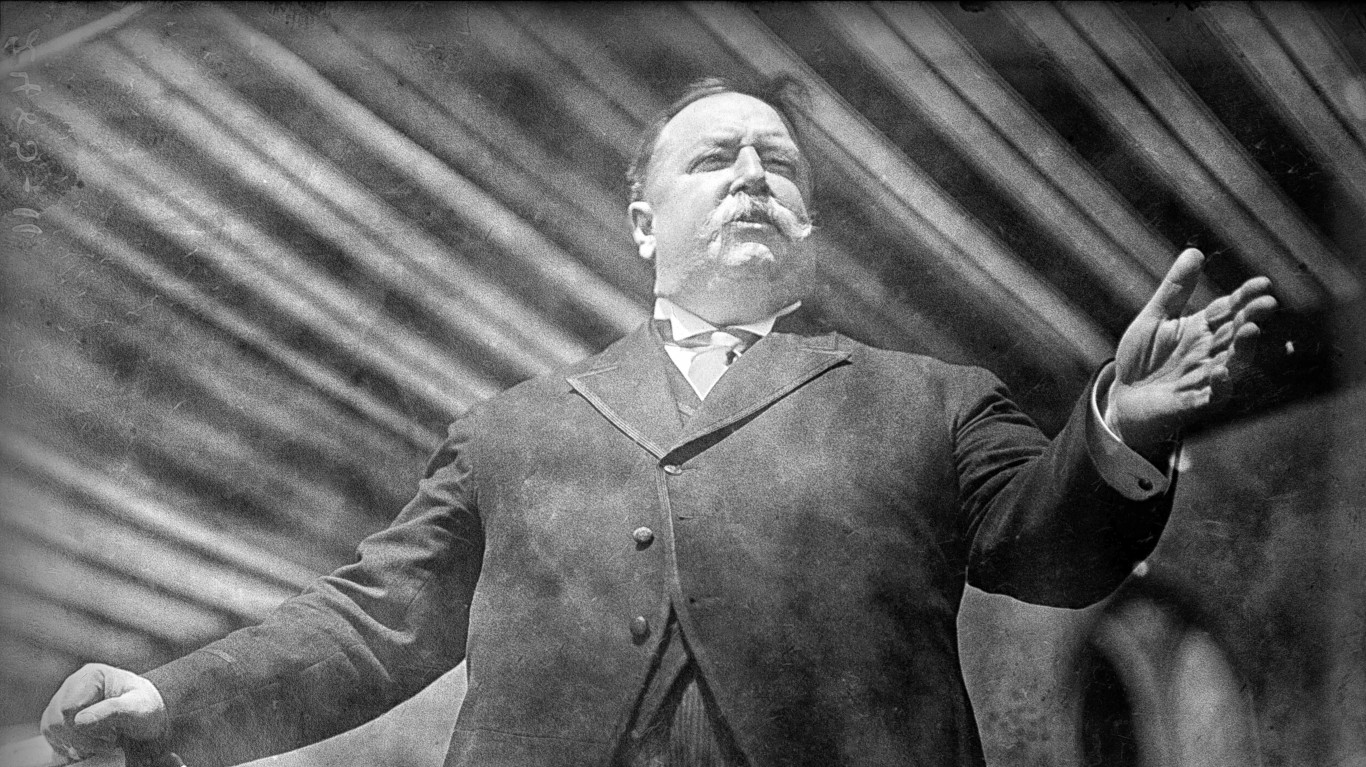
27th: William Howard Taft
> Est. peak net worth: $3.1 million
> In office: 1909-1913
William Howard Taft’s father-in-law was a law partner of former president Rutherford B. Hayes. Taft was president of the American Bar Association, an active attorney for nearly two decades, and the only president to serve on the U.S. Supreme Court.
[in-text-ad]
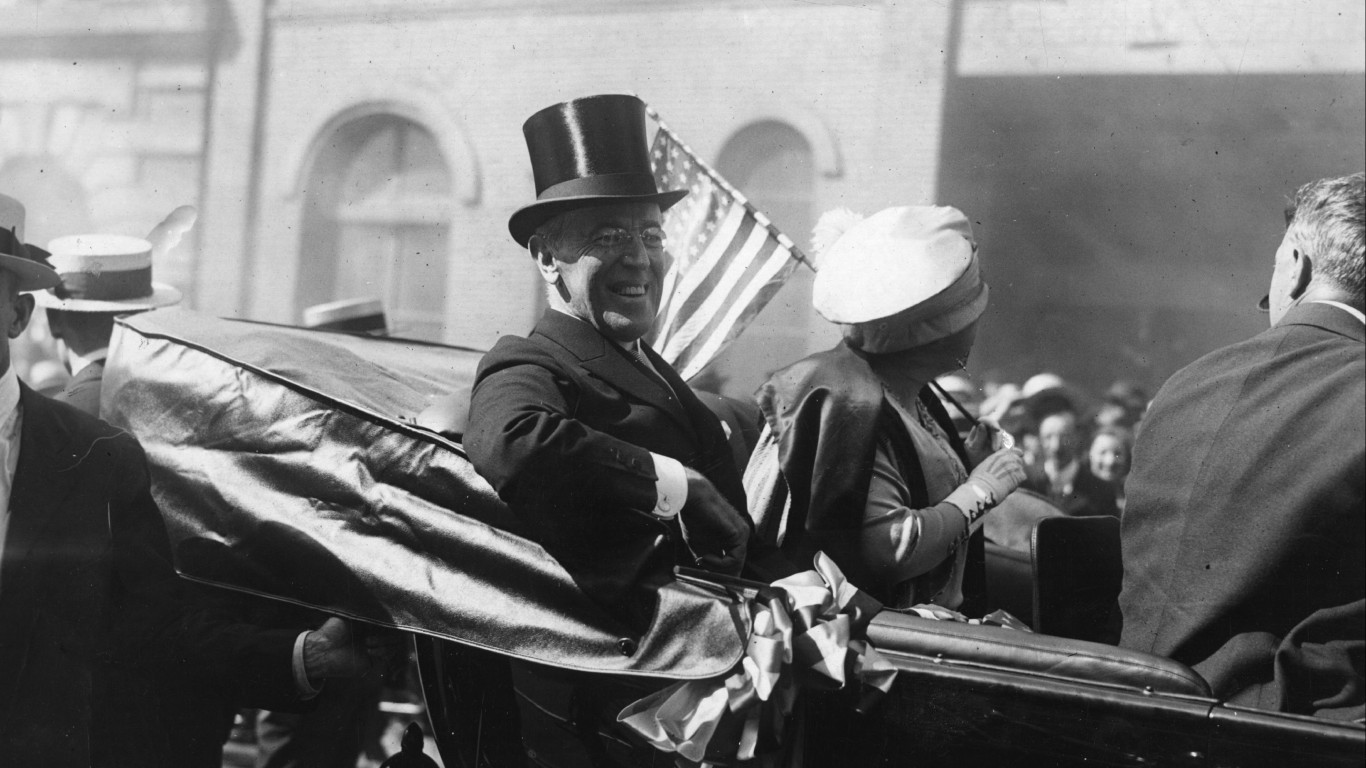
28th: Woodrow Wilson
> Est. peak net worth: less than $1 million
> In office: 1913-1921
Woodrow Wilson received modest compensation as head of Princeton and governor of New Jersey. He never served in any position that provided him with a substantial income. Wilson had a stroke in office and died five years later.
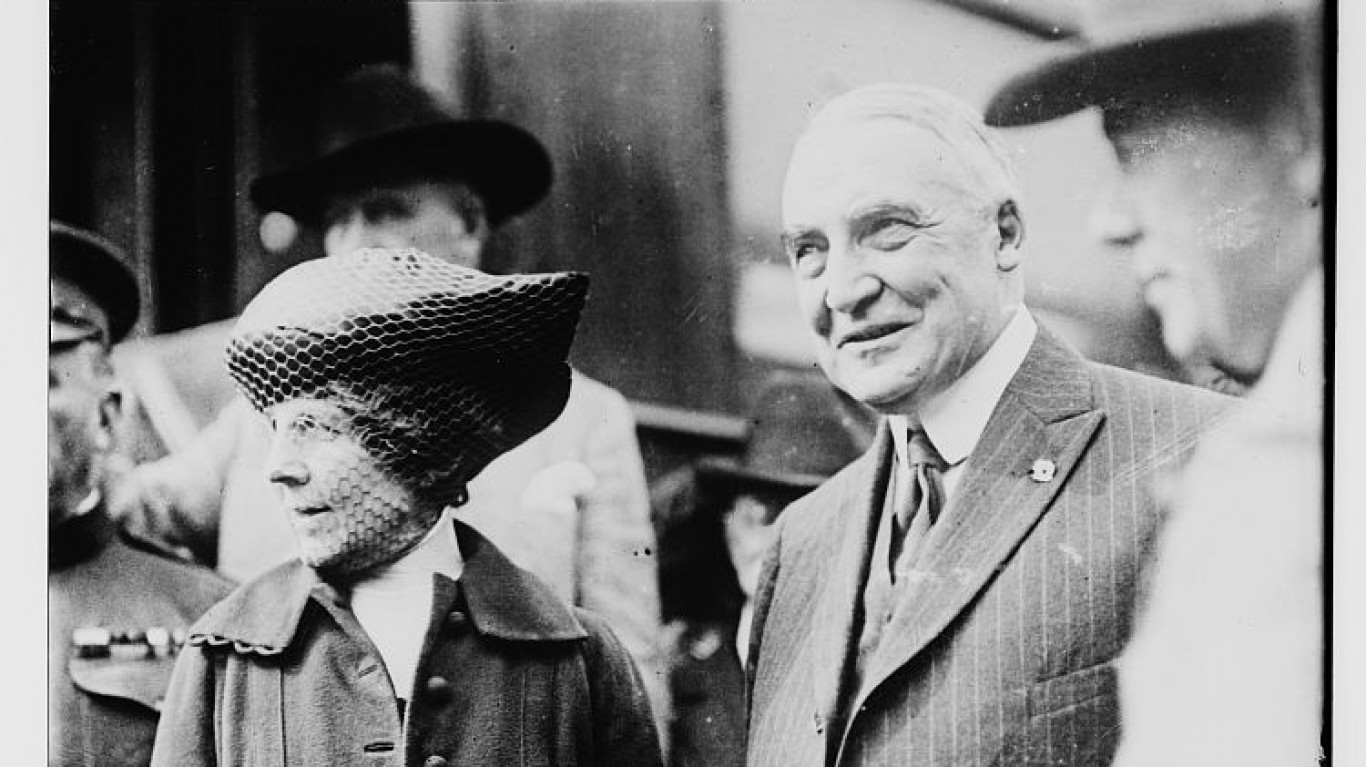
29th: Warren Gamaliel Harding
> Est. peak net worth: $1.0 million
> In office: 1921-1923
Much of Warren Harding’s net worth came from his wife, Florence. She was the daughter of a wealthy businessman and her business skills helped his newspaper, the Marion Star, become successful.
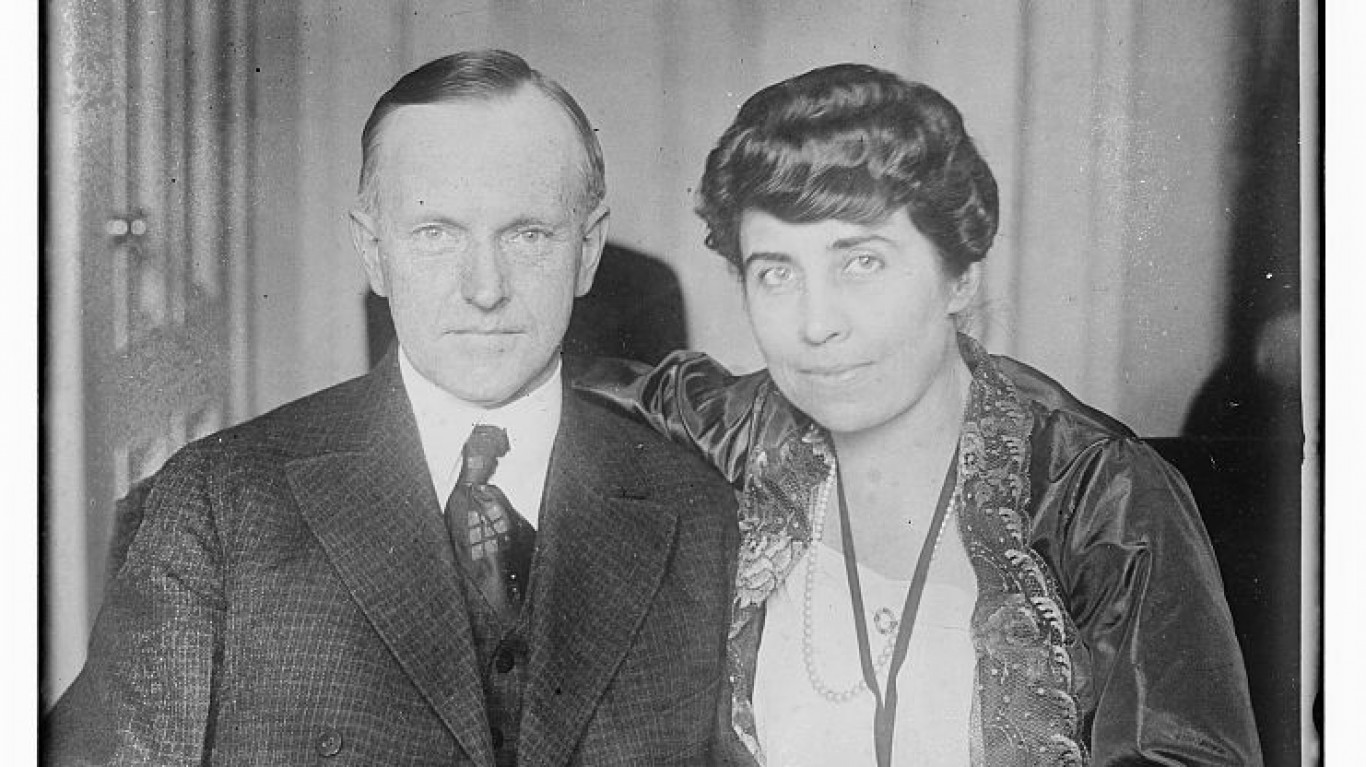
30th: Calvin Coolidge
> Est. peak net worth: less than $1 million
> In office: 1923-1929
Calvin Coolidge’s father was a prosperous storekeeper and community official. He spent years as an attorney and also served as the governor of Massachusetts. He derived his net worth primarily from his home, The Beeches, in Northampton, Massachusetts. Some of Coolidge’s net worth can also be attributed to the advance he received on his autobiography as well as the money he made from his newspaper column.
[in-text-ad-2]

31st: Herbert Clark Hoover
> Est. peak net worth: $84.0 million
> In office: 1929-1933
Herbert Hoover was orphaned as a child, but he overcame his struggles to become a successful businessman and politician. After graduating from Stanford and before entering politics, Hoover worked as a mining engineer, becoming an expert in the field. He went on to own several Burmese silver mines and write a mining engineering textbook, all of which contributing to his considerable wealth.

32nd: Franklin Delano Roosevelt
> Est. peak net worth: $67.6 million
> In office: 1933-1945
Coming from the wealthy and powerful Roosevelt family, Franklin Delano Roosevelt inherited much of his wealth. FDR spent almost his entire adult life in public service, beginning at age 28 when he ran to the New York state senate. FDR died in office after being elected president for a fourth time.
[in-text-ad]
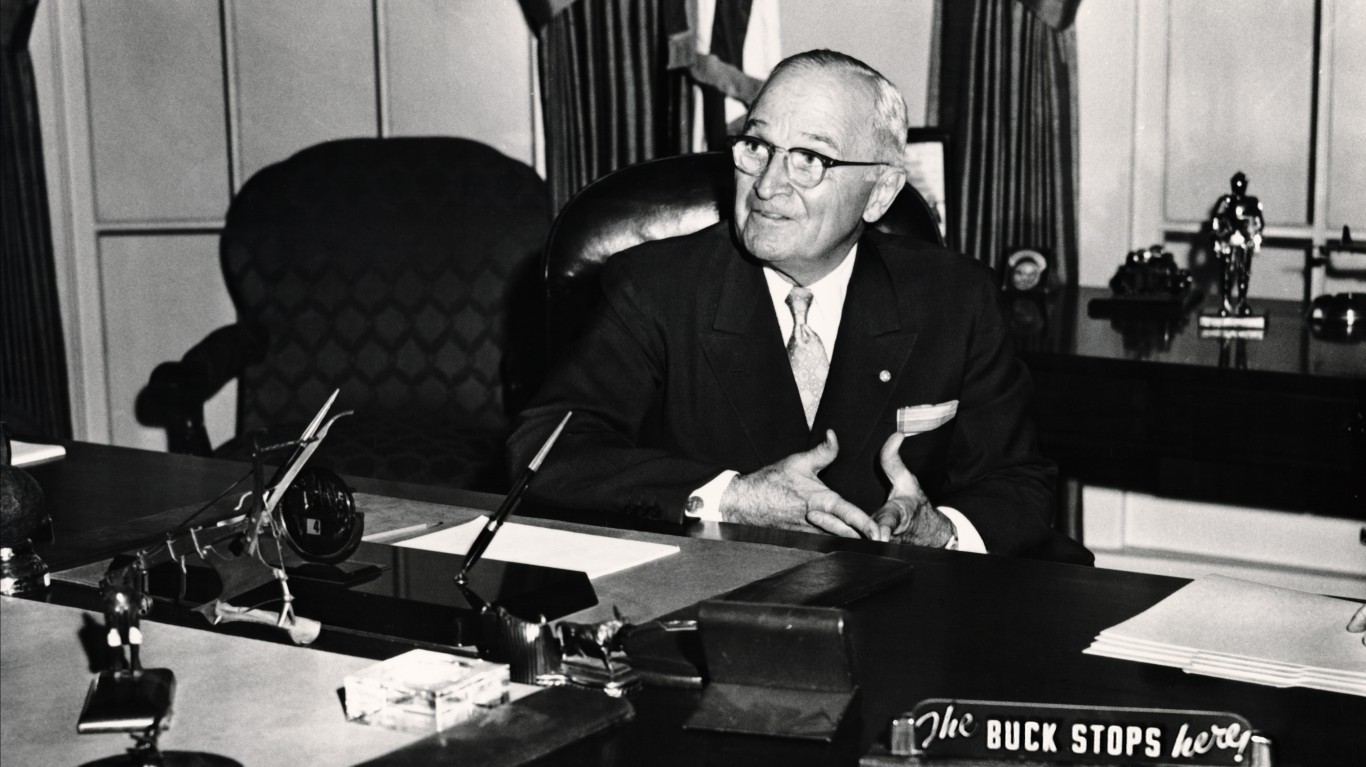
33rd: Harry S. Truman
> Est. peak net worth: less than $1 million
> In office: 1945-1953
Harry Truman was a haberdasher in Missouri and nearly went bankrupt. He served 18 years in Washington, D.C. Despite his modest income, he was able to save some of his presidential salary. He was also the first ever Medicare recipient.

34th: Dwight David Eisenhower
> Est. peak net worth: $9.2 million
> In office: 1953-1961
Dwight David Eisenhower had no inherited wealth. He served the majority of his career in the military and five years as president of Columbia University. Ike owned a large farm in Gettysburg, Pennsylvania.
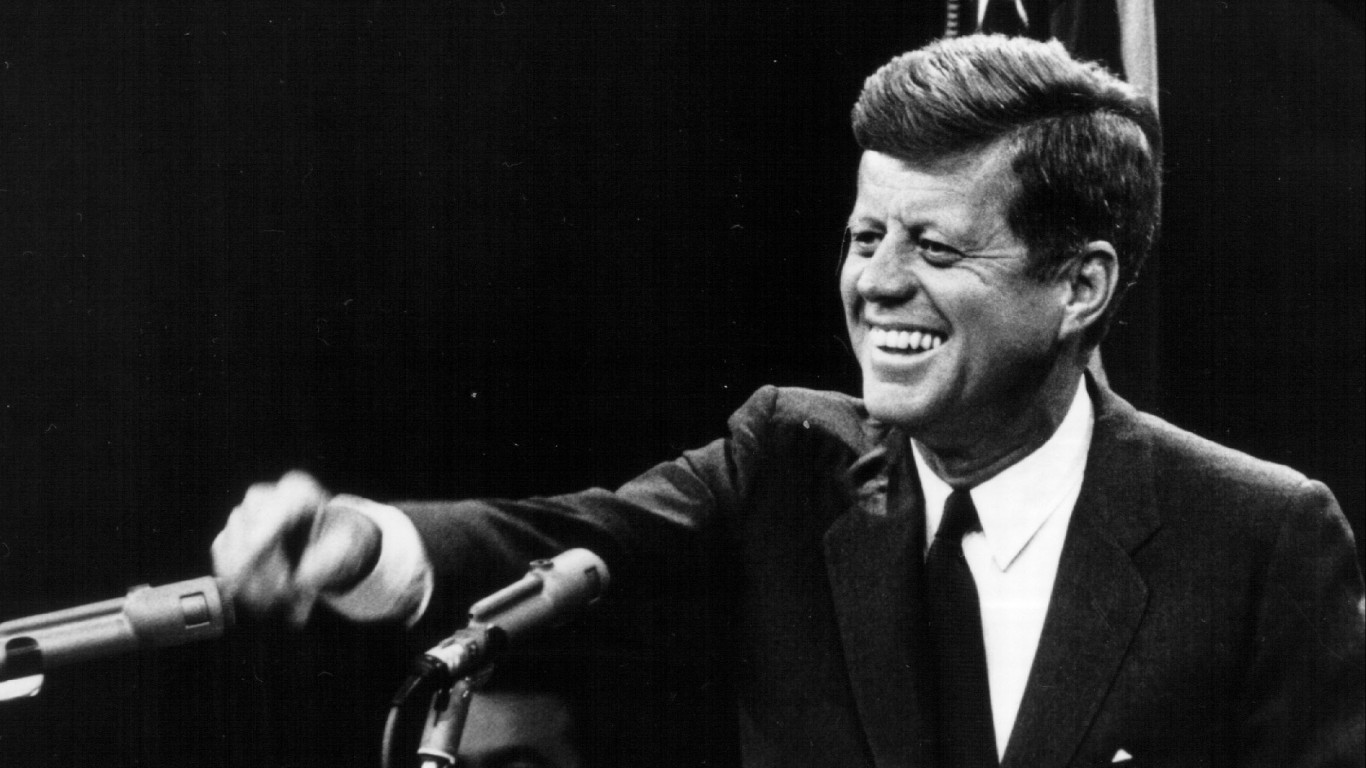
35th: John Fitzgerald Kennedy
> Est. peak net worth: $1.1 billion
> In office: 1961-1963
The Kennedys are one of the most powerful and influential families in American politics, and that was even more true in the 1960s. John F. Kennedy’s father, Joe, made much of his fortune through banking and investing. He was one of the richest men in the United States, and the family fortune endures to this day. Kennedy clearly benefited from his family’s wealth, but estimating his exact net worth at its highest point is especially difficult.
A number of other siblings shared a portion of the trust. In addition to the family’s wealth, Kennedy’s wife Jacqueline, was heiress to a vast oil fortune. The couple’s combined wealth amounted to more than a billion dollars when adjusted for inflation.
[in-text-ad-2]
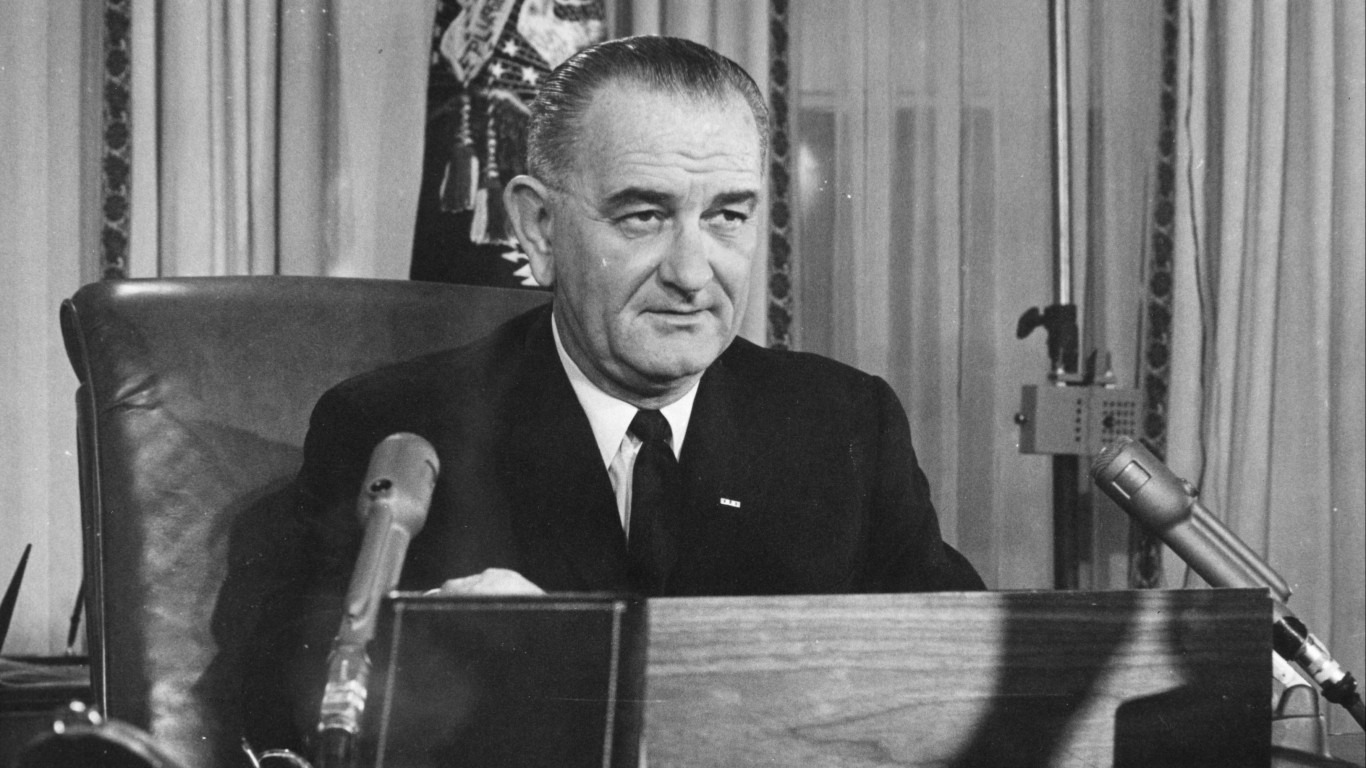
36th: Lyndon Baines Johnson
> Est. peak net worth: $110.6 million
> In office: 1963-1969
Lyndon Baines Johnson owned assets such as livestock and 1,500 acres of land in Texas. However, the main source of income for Johnson and his wife, Lady Bird, was their Texas TV and radio station business. Though the radio station KTBC was technically in Lady Bird’s name, LBJ reportedly used his considerable influence as a member of Congress to make the acquisition go smoothly and make the station a success. The Johnsons later expanded their portfolio to include other TV and radio stations in Texas.

37th: Richard Milhous Nixon
> Est. peak net worth: $17.4 million
> In office: 1969-1974
Richard Nixon was born into a working-class family, to parents who ran a grocery store and a gas station. He was a public servant for most of his life, also serving several years as a U.S. senator from California. Nixon made significant sums from a series of interviews with David Frost and book advances. He sold his New York townhouse to the Syrian ambassador to the U.S. and purchased a large home in Saddle River, New Jersey. At various times, Nixon also owned real estate in California and Florida.
[in-text-ad]
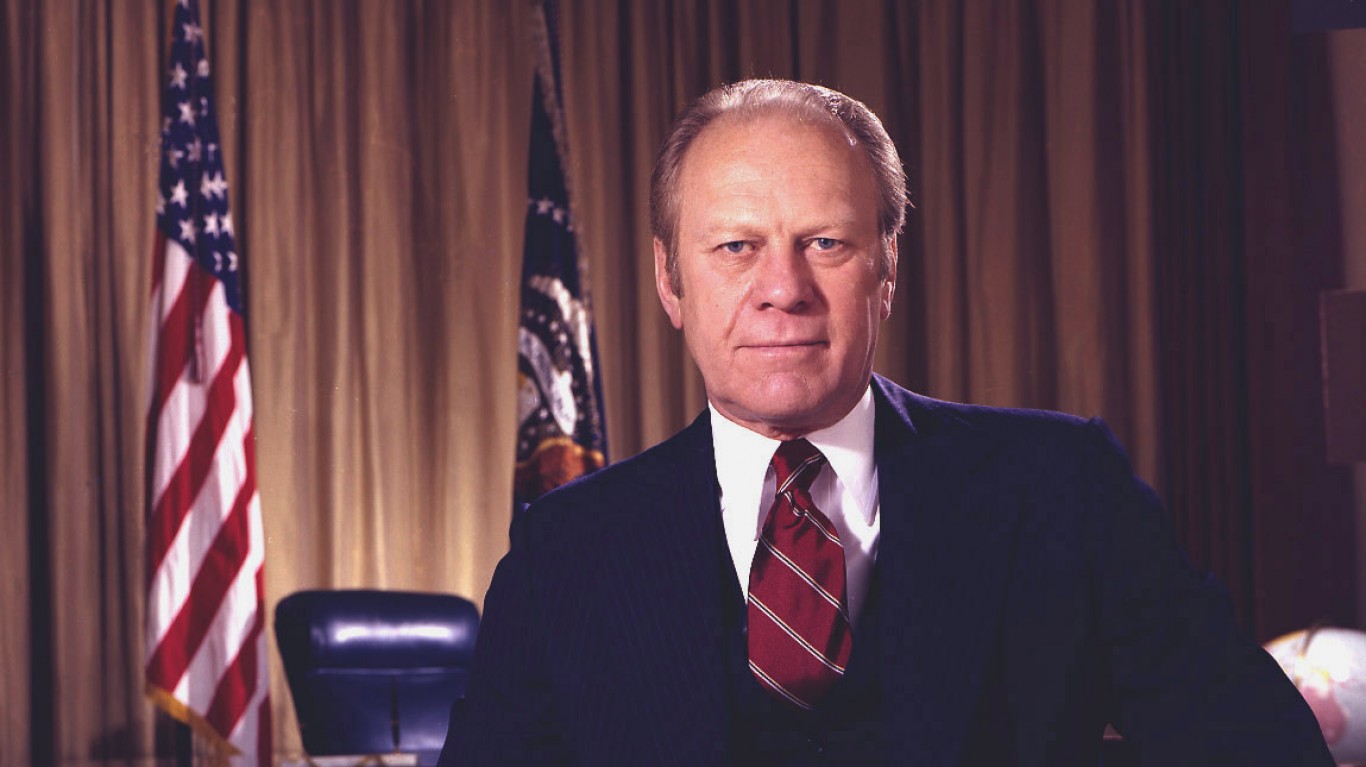
38th: Gerald Rudolph Ford Jr.
> Est. peak net worth: $8.2 million
> In office: 1974-1977
Gerald Ford had a modest upbringing and spent virtually his entire adult life in public service. Over the course of his lifetime, he owned properties in Palm Springs, California, and Vail, Colorado. After he left the White House in 1977, he made nearly $1 million within a year from speaking fees and from serving on the boards of several prominent American companies.
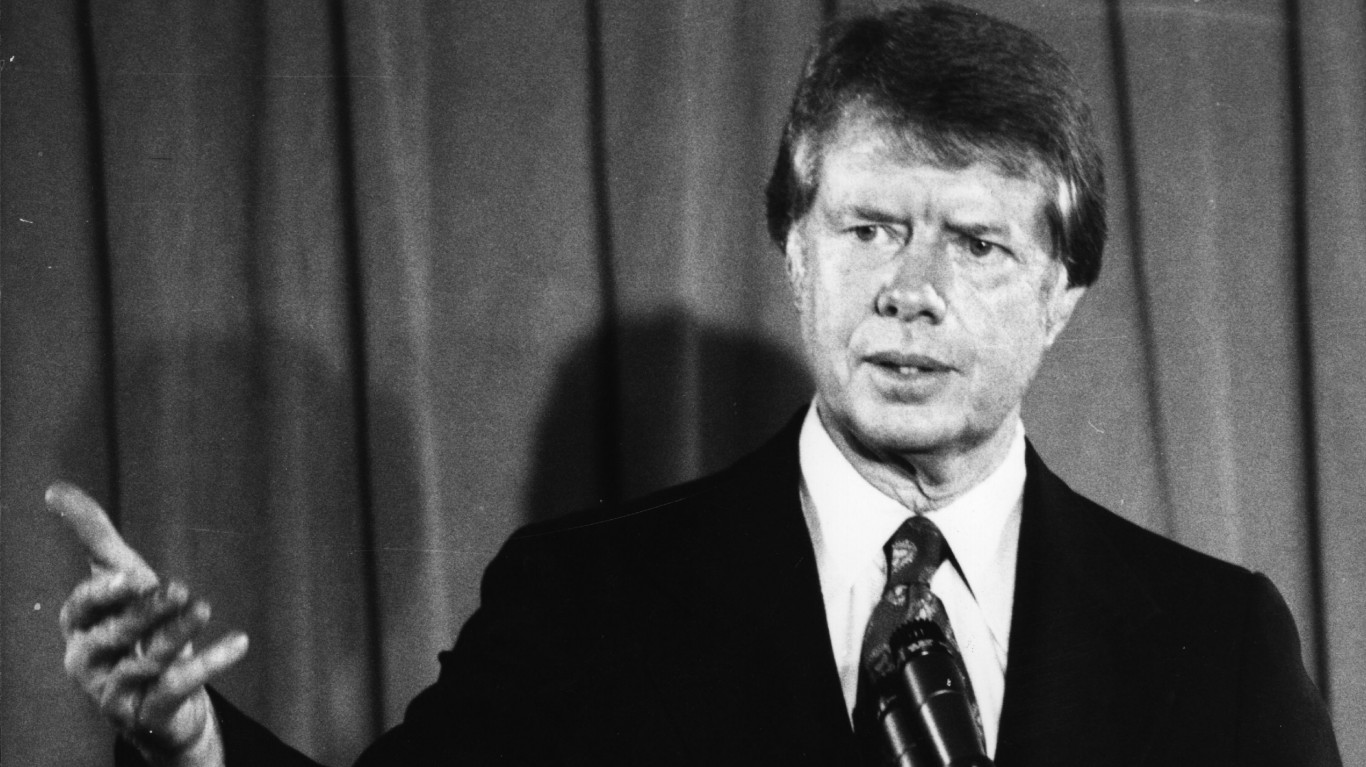
39th: James Earl Carter
> Est. peak net worth: $8.2 million
> In office: 1977-1981
Jimmy Carter’s father worked as a peanut farmer in rural Georgia and he did not leave the 39th president much of a inheritance. Carter took over the family farm following his father’s death and struggled to make it successful. In his first year on the farm, Carter made just $200, and he and his wife were forced to live in subsidized housing.
Though Carter eventually turned the farm into a successful agriculture business, during his presidency, the business failed as the farm was managed by a blind trust. He left the White House in debt but improved his finances by writing books. Carter and his wife have published more than 30 books.

40th: Ronald Wilson Reagan
> Est. peak net worth: $14.3 million
> In office: 1981-1989
Ronald Reagan had no inheritance, but he made money as a movie and television actor for over two decades. He owned several pieces of real estate over his lifetime, including a 688-acre property near Santa Barbara, California. Reagan was highly paid for his role as a GE spokesman before his political career. He also made significant money from his autobiography.
[in-text-ad-2]

41st: George Herbert Walker Bush
> Est. peak net worth: $26.6 million
> In office: 1989-1993
George H.W. Bush, as part of the wealthy and powerful Bush family, has always been well off financially. Bush made his initial fortune running an offshore oil drilling company and owned millions of dollars worth of property, including an estate in Kennebunkport, Maine, which around the time of his death in November 2018, was valued at $13.5 million.

42nd: William Jefferson Clinton
> Est. peak net worth: $76.8 million
> In office: 1993- 2001
Since leaving office, former President Bill Clinton has made millions from his 2005 book “My Life.” Much of his wealth, however, actually comes from his wife, Hillary. The former secretary of state and Democratic presidential candidate reportedly received a $14 million advance for her 2014 memoir “Hard Choices” — one of the largest advances of all time. She also made millions from a number of paid speeches. Because the two are married, their net worths are combined.
[in-text-ad]

43rd: George W. Bush
> Est. peak net worth: $40.0 million
> In office: 2001-2009
George W. Bush was a businessman before he got into politics and became the governor of Texas. He made a small fortune in the oil industry and even owned the Texas Rangers professional baseball team at one point. Bush has made tens of millions of dollars in speaking fees and from a book deal since leaving office.

44th: Barack Hussein Obama
> Est. peak net worth: $135 million
> In office: 2009-2017
Barack Obama’s net worth has climbed considerably since he left office in January 2017. The Obama family has a number of income streams, including a production deal with Netflix worth an estimated $50 million, on top of paid speeches and a government pension. Michelle Obama’s memoir “Becoming,” for which she received a reported $65 million advance, was a best seller in 2018. Estimates as to the 44th president’s net worth range from $40 million to as much as $135 million. The Obama family reportedly purchased a nearly 7,000 square foot, $12 million home on Martha’s Vineyard in December 2019.
45th: Donald John Trump
> Est. peak net worth: $3.2 billion
> In office: 2017-present
Before he entered politics, Donald Trump was a prominent figure in New York City’s real estate scene. Trump took over his father’s business and grew it into an empire. Though many of his other businesses have failed, Trump’s vast property holdings make him by far the wealthiest president of all time.
In addition to a number of New York City buildings, Trump owns over a dozen golf clubs and many resorts. Trump broke precedent when he declined to release his tax returns as a candidate and later as president, so it is difficult to know his exact worth.
Retirement planning doesn’t have to feel overwhelming. The key is finding professional guidance—and we’ve made it easier than ever for you to connect with the right financial advisor for your unique needs.
Here’s how it works:
1️ Answer a Few Simple Questions
Tell us a bit about your goals and preferences—it only takes a few minutes!
2️ Get Your Top Advisor Matches
This tool matches you with qualified advisors who specialize in helping people like you achieve financial success.
3️ Choose Your Best Fit
Review their profiles, schedule an introductory meeting, and select the advisor who feels right for you.
Why wait? Start building the retirement you’ve always dreamed of. Click here to get started today!
Thank you for reading! Have some feedback for us?
Contact the 24/7 Wall St. editorial team.